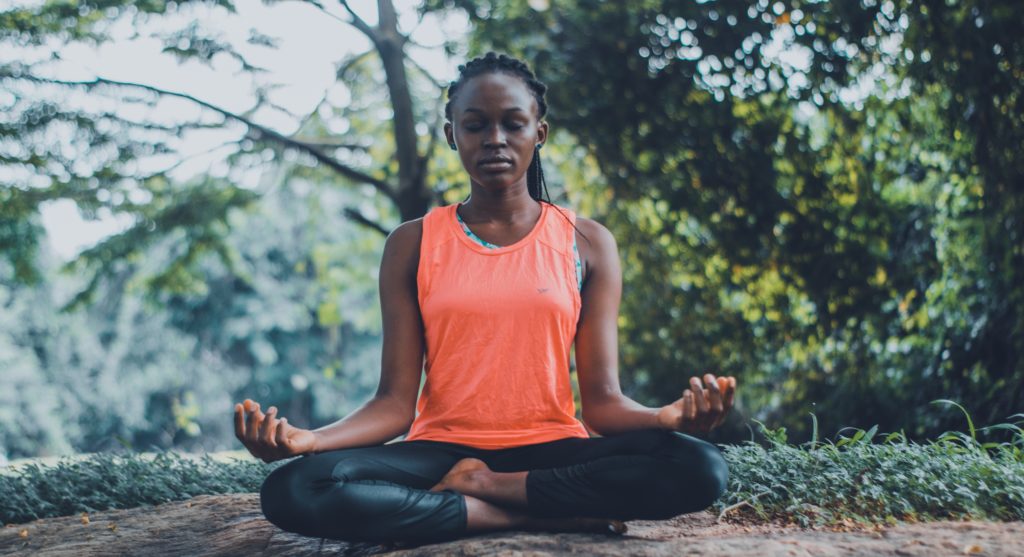Stress and migraine feed into each other. Four out of five people with migraine say stress is a trigger for migraine attacks. At the same time, living with migraine is stressful — leading to more attacks.
Our stress response is hard-wired into our bodies and can’t be eliminated. But it can be controlled in ways that help manage migraine. Meditation, mindfulness and relaxation are powerful techniques that train your brain to counteract its stress response. Research has shown these practices to be among the most important lifestyle changes you can make to reduce the frequency and intensity of migraine.
Practicing any of these techniques for even two minutes a day will put you on the path to greater migraine control.

Learning Mindfulness for Greater Migraine Control
It can be hard to live “in the moment” because of how much the mind loves to drift. All too often, it drifts in unhelpful directions. Either it gnaws at the past, which can’t be changed, or it worries about the future, which is outside our control.
That’s when the stress cascade begins. Difficult thoughts stir up difficult feelings. Difficult feelings make the brain assume there’s a threat out there — a reaction left over from the caveperson era — prompting it to unleash the body’s stress response. If we still lived in caves, that response would help supercharge you to fight or flee for survival. Instead, that hormonal burst paves the way for a migraine attack.
Mindfulness interrupts that cycle. It involves steering your anxious mind away from distraction and back to whatever it is you’re doing in the present moment. Each time you notice your mind drift and guide your thoughts back to the present, it’s like a tiny bicep curl for your brain: You’re conditioning your nervous system to respond to stressful thoughts with calm, rather than spiraling further into a stress response. With time and practice, that conditioning helps improve migraine.
The Care Tuner app has many ways to practice mindfulness for migraine, including activities to help you cultivate:
-
- Breath awareness
- Moments of gratitude
- Mindfulness to sensation
- Mindful eating

Meditation for Headache and Migraine Improvement
Meditation is the formal practice of mindfulness. It’s when you set aside a few minutes dedicated to doing nothing except being present. The goal is to eventually work your way up to 20 minutes per day, which is the amount of time shown to have a meaningful positive impact on migraine, mood, and anxiety. If you’re just getting started, though, remember that any amount of meditation practice helps to strengthen your relaxation response.
Many people find it helpful to practice through guided meditation, in which someone’s voice keeps you engaged. The Care Tuner app has many expert-guided meditation audios and videos geared for migraine, including:
-
- Self-compassion meditation
- Defusion meditation – that is, putting space between our emotions and our responses
- Confidence-building meditation
- Sleep meditations
- Meditations to shift your relationship with pain
In addition, the meditation component of exercises like yoga, tai chi and qigong are valuable for headache and migraine. Our app contains videos guiding you through each type of exercise.
Relaxation Techniques to Reduce Migraine Symptoms
When you’re under stress, your muscles often respond by tensing. That tension can itself become a source of stress signals that can bring on migraine attacks. Releasing areas of tension before they become a problem is important for reducing migraine. You can do so with a practice called relaxation training. It helps you pay attention to your body so that you learn to recognize and intentionally reduce areas of tension. It has an added benefit: As the body relaxes, so too does the mind.
Like mindfulness and meditation, relaxation counterbalances the stress response, making it an important part of your migraine toolkit. The Care Tuner app has guided audios for relaxation techniques including:
-
- Guided imagery and visualization
- Body scan
- Autogenics
- Breathing exercises
Adding meditation to your migraine treatment routine
Mindfulness, meditation and relaxation practices are valuable tools for bringing down your stress levels while increasing your calm and comfort. With consistency and time, these techniques actually raise the brain’s resistance to migraine attacks.
When you’re ready to feel better, there’s no such thing as starting too soon. Take the next step today by downloading the Care Tuner app.






